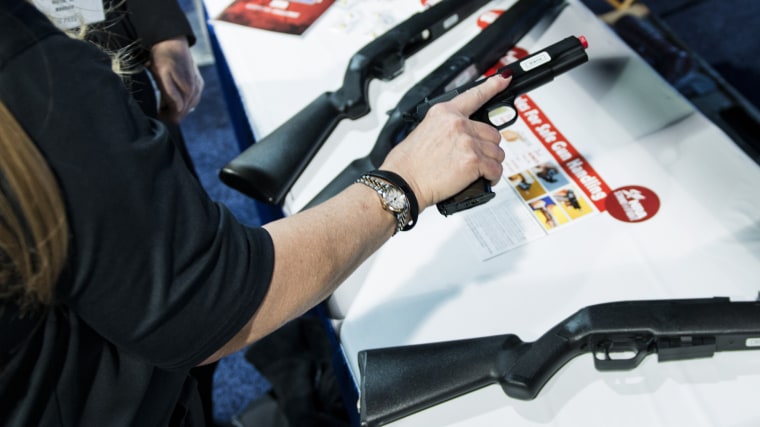Of the 745,000 refugees resettled in the United States since September 11th,
zero Syrians have faced charges related to terrorism. But at a Capitol Hill press conference yesterday, that's not the angle Senate Majority Leader Mitch McConnell (R-Ky.) wanted to emphasize.
"I would just mention a case a few years ago in my state," the Republican leader said. "There was a person from Iraq who came into the U.S. as a refugee, vetted, who ended up being arrested for plotting a terrorist attack... So the ability to vet people coming from that part of the world is really quite limited."
McConnell's argument isn't altogether fair. The Iraqi refugee in Kentucky actually tried to take advantage of lax American gun laws to
send weapons to Iraq, not launch an attack in the U.S. -- a detail the senator neglected to mention. For that matter, pointing to one guy out of 745,000 is hardly proof of an unreliable vetting process.
But the more interesting part came in response to a reporter's question.
Q: There's been a certain amount of resurgence in interest over a bill that's been floating around here about whether people on terror watch lists should be able to legally buy guns in this country. Should they be able to? MCCONNELL: [Shrugs shoulders.] Q: On the FBI terror watch list? MCCONNELL: Yeah, I'm not particularly familiar with that.
Told that Sen. Dianne Feinstein (D-Calif.) and Rep. Peter King (R-N.Y.) have pushed legislation on this -- the measure was
introduced nine months ago -- McConnell added, "I'm not familiar with the legislation, so I'll pass on it."
Perhaps now would be a good time for the Senate Majority Leader to get up to speed on this, because if we're going to have a debate about counter-terrorism and national security, we might also want to chat about potential terrorists having easy access in the United States to all kinds of deadly weapons.
The
Washington Post published
this piece on Monday.
Given France's strict gun laws, the terrorists who attacked Paris on Friday may have turned to black market sources for the weapons they used. But in the United States, known and suspected terrorists are allowed to purchase firearms under federal law. "Membership in a terrorist organization does not prohibit a person from possessing firearms or explosives under current federal law," the Government Accountability Office concluded in 2010. The law prohibits felons, fugitives, drug addicts and domestic abusers from purchasing a firearm in the United States. But people on the FBI's consolidated terrorist watchlist -- typically placed there when there is "reasonable suspicion" that they are a known or suspected terrorist -- can freely purchase handguns or assault-style rifles.
I can appreciate why this may sound ridiculous -- probably because it is -- but if someone is placed on the FBI's terrorist watchlist, and they go to an American airport to buy a plane ticket, someone behind the counter will say, "No."
If that same person on the terrorist watchlist leaves the airport, drives to a gun show, and tries to stock up on assault rifles, someone behind the counter will likely say, "No problem."
Congress has the power to change this, but it doesn't want to.
What's more, note that this isn't a hypothetical: the Post's piece added that between 2004 and 2014, "suspected terrorists attempted to purchase guns from American dealers at least 2,233 times. And in 2,043 of those cases -- 91 percent of the time -- they succeeded."
The point isn't lost on policymakers this week, though TPM
reported yesterday on just how twisted the recognition of current policies can be.
Republican state Rep. Tony Dale is concerned that Texas' lax gun laws could allow Syrian refugees to launch terror attacks on American soil. In a two-page letter sent to U.S. Sen. John Cornyn (R-TX) on Monday, Dale asked state officials to reject the resettlement of more Syrian refugees within the Lone Star State’s borders after Friday's terror attacks in Paris. He argued that immigration documents granted to refugees would allow them to obtain Texas drivers' licenses, which in turn would allow them to procure firearms.
"While the Paris attackers used suicide vests and grenades it is clear that firearms also killed a large number of innocent victims," Dale wrote. "Can you imagine a scenario were [sic] a refugees [sic] is admitted to the United States, is provided federal cash payments and other assistance, obtains a drivers license and purchases a weapon and executes an attack?”
To be sure, Texas has incredibly lax gun laws, which theoretically could be exploited by people who intend to do great harm to the American public. This week, however, a Republican state legislator doesn't want to make it harder to buy deadly weapons; he wants to make it harder for refugees to get to Texas.
It's like living in a Lewis Carroll novel, isn't it?
